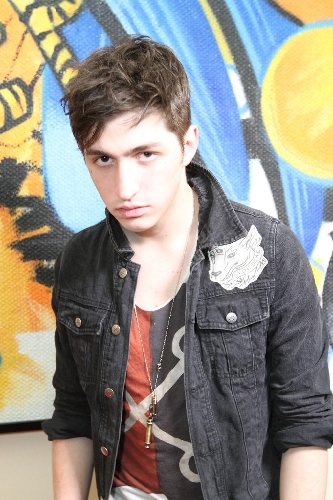Porter Robinson works way to DJ stardom at early age

Earlier this year, I saw Porter Robinson, at age 19, escorted into Wynn Las Vegas so he could DJ at XS nightclub. He played fun tunes. Afterward, security escorted the teen out of the club.
Robinson, now 20, is one of but a few superstar DJs who are too young to walk into a 21-and-older club on his own accord.
Our question: Why are there so few young DJs, in contrast to all the teeny-bopper pop stars populating America?
Robinson – performing Saturday at XS, and Sunday at Encore Beach Club – gives us a good explanation.
“The reason there’s not so many young people in dance music than there is in pop or rock,” he says, “is because electronic musicians almost always have to do it for themselves.”
That is, DJ-producers are not creations of record label machinery. Pop singers are handed songs, bands, producers, engineers, video directors and marketing budgets.
By contrast, if DJs are as lucky as Robinson (a whiz kid from university-rich Chapel Hill, N.C.), they hit their young stride by learning music, practicing songwriting and remixing at home, being escorted into clubs, and earning buzz over several years.
“They (DJs) can’t be manufactured. They can’t have someone come in and make it for them,” Robinson says.
“There are examples of electronic musicians who have people writing for them, and they preprogram their DJ sets. But those are people who have a lot of resources. They have a ton of money. And 19-year-olds don’t do that.”
So if you are going to succeed in electronic music, you have to make it happen yourself, he says.
“Which means there’s gonna be a lot fewer people who achieve that – whereas you can make any sexy 19-year-old girl into a pop star if she’s got the chops.”
Robinson’s explanation reminds me of comedians: Comics also have to develop skills over time. Even if a young comedian were to pay another comic to write his jokes, he or she would still toil for years onstage alone, developing timing and persona skills.
That’s why you almost never see young comedians (under 21) break through to mass pop culture stardom.
Robinson agrees with that DJ-comedian comparison.
“Yeah, yeah, exactly,” he says. “It can’t be done for you. I think the comedian analogy is a great one.
“There’s a lot of crossover between music performance and stand-up comedy. I watched Louis CK talk about what it’s like to be on the road, and how it feels when he has a good show versus a bad show, and how women treat him differently. There are a lot of parallels.”
Doug Elfman’s column appears Tuesdays, Thursdays and Fridays. Email him at delfman@reviewjournal.com. He blogs at reviewjournal.com/elfman.